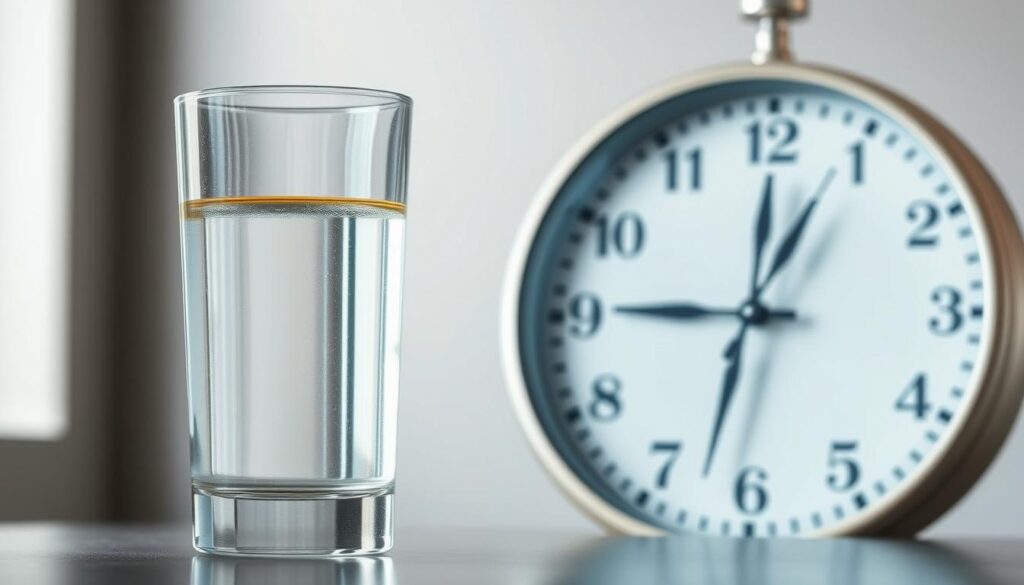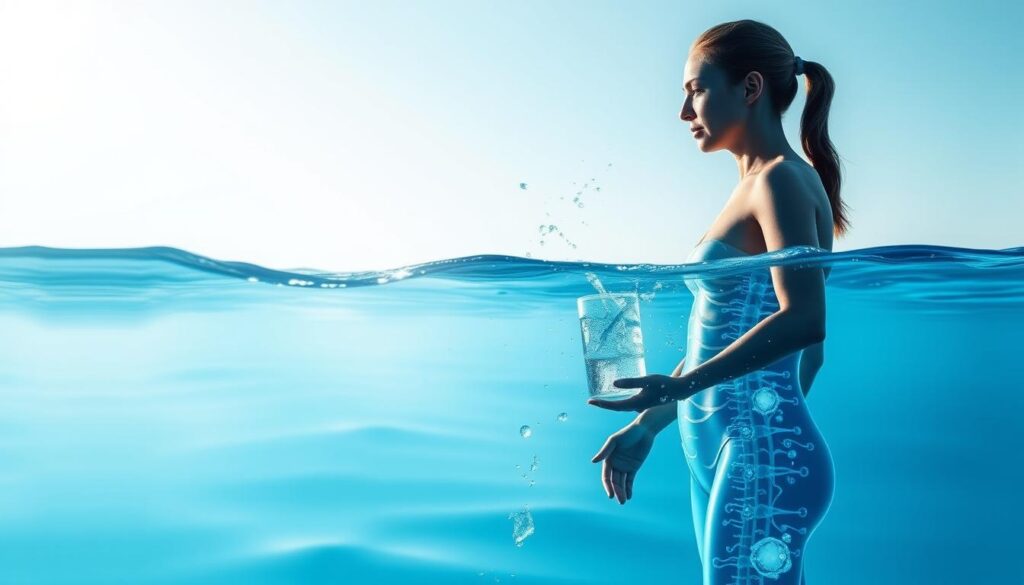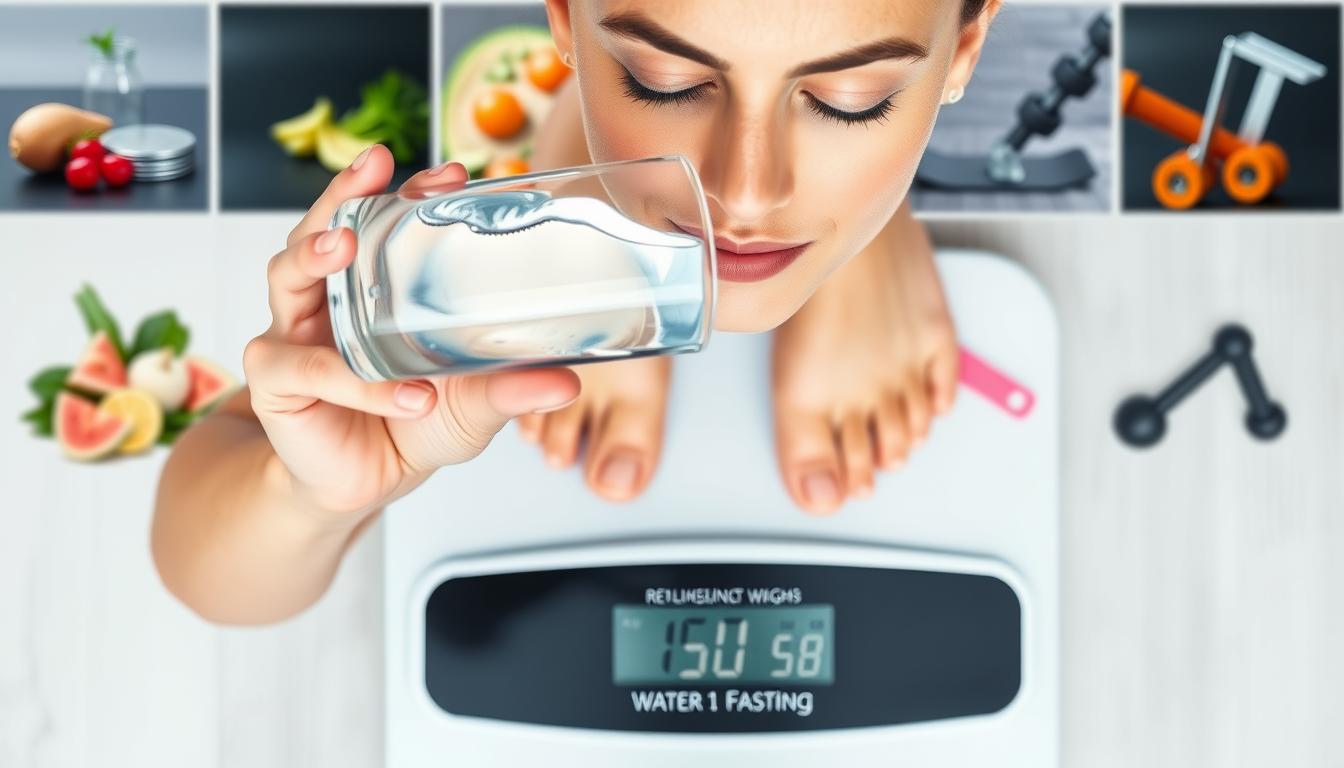Water fasting has become more popular as a fast way to lose weight and boost health. It means not eating or drinking anything except water for 24 to 72 hours. Some studies show it can help with autophagy, lower blood sugar, and protect the heart.
But, fasting without the right advice can cause dehydration and other health issues. It’s key to fast safely and talk to a doctor before starting. Pregnant women, people with chronic illnesses, and those with eating disorders should not fast.
This guide will cover the good and bad of water fasting. It will give tips for safe fasting and help you decide if it’s right for you. By learning about water fasting and how to do it right, you can make smart choices for your health.
Key Takeaways:
- Water fasting involves consuming only water for 24 to 72 hours, with the goal of promoting weight loss and potential health benefits.
- Studies suggest that water fasting may stimulate autophagy, improve blood sugar control, and reduce risk factors for chronic diseases.
- Risks of water fasting include dehydration, electrolyte imbalances, muscle loss, and worsening of certain medical conditions.
- Consulting with a healthcare professional is crucial before attempting water fasting, especially for beginners or those with underlying health issues.
- Safe water fasting practices involve gradual preparation, staying hydrated, listening to your body, and breaking the fast carefully to avoid complications.
What is Water Fasting?
Water fasting means not eating or drinking anything except water for a while. It can last from 24 to 72 hours. Some might even do a 7-day fast, but that should be with a doctor’s watchful eye.

Definition of Water Fasting
On a water fast, you only drink water and skip all other foods and drinks. This break lets your body repair cells and detox without digesting food.
History and Purpose of Water Fasting
Fasting has been around for ages, linked to many spiritual and religious beliefs. It’s seen as a way to cleanse the spirit, discipline oneself, and clear the mind. Now, water fasting is also seen as a health boost.
People fast for many reasons, like:
- Promoting weight loss
- Improving insulin sensitivity and blood sugar levels
- Enhancing heart health
- Supporting the body’s natural detoxification processes
- Encouraging cellular repair through autophagy
But, fasting should be done carefully and with a doctor’s advice. Some people, especially those with health issues, should not fast or should do it very carefully.
| Duration | Recommendations |
|---|---|
| 24-72 hours | Typical duration for water fasting |
| 7 days | Can be done by healthy individuals, but medical supervision is advised |
| 30-40 days | Should only be attempted under strict medical supervision |
“Fasting is the greatest remedy, the physician within.” – Philippus Paracelsus, Swiss physician and alchemist
Changing your diet or fasting should always be done with care for your health. If you’re thinking about a water fast, talk to a doctor first. They can tell you if it’s right for you and how to do it safely.
Potential Benefits of Water Fasting
Water fasting has been around for centuries. Recent studies have shown it could be good for our health. But, we need more research, especially in humans. Here are some benefits linked to water fasting:

Promotes Autophagy
Autophagy is when our body cleans out damaged cells. Studies on animals show water fasting can boost this process. It might help fight diseases like cancer, Alzheimer’s, and heart disease. By cleaning cells, water fasting could make us healthier and live longer.
May Improve Blood Sugar Levels
Water fasting can make our bodies more sensitive to insulin. This is key for keeping blood sugar levels healthy. A review found that fasting for three days or more cut insulin levels by 30%. But, a 2022 study saw insulin resistance go up after a 10-day fast and five days of eating again. We need more research on this.
Could Help Protect Heart Health
Water fasting might help prevent heart disease by raising good cholesterol and lowering bad fats. In one study, 90% of people with high blood pressure got their pressure back to normal after fasting. A 2022 study also found big drops in blood pressure after a 10-day fast and five days of eating again.
| Study | Duration | Findings |
|---|---|---|
| 2022 study on water fasting | 10-day water-only fast + 5 days refeeding | Clinically significant reductions in systolic and diastolic blood pressure |
| Older study on hypertension and water fasting | Medically supervised water fast (duration not specified) | 90% of individuals with hypertension had their blood pressure normalize |
May Increase Weight Loss
Water fasting cuts calories, leading to weight and fat loss. A study of 12 men in their 50s lost an average of 13 pounds after eight days of fasting. But, a lot of the weight loss might be water and muscle, not fat. To keep the weight off, eating well and staying active is key.
“Water fasting is not a magic bullet for weight loss or health improvement. It should be approached with caution and under the guidance of a healthcare professional, especially for extended fasts.” – Dr. Sarah Thompson, Nutritionist
Water fasting could be good for health, but we must think about the risks and talk to a doctor before starting.
Risks and Dangers of Water Fasting
Water fasting can help you lose weight and may improve your health. But, it’s important to know the risks before starting. Always talk to a doctor, especially if you have health issues.
May Lose the Wrong Type of Weight
Water fasting can lead to quick weight loss. But, a lot of this weight loss might be from water, carbs, and muscle, not just fat. A study found that fasting for 4 to 21 days led to changes in body composition, including muscle loss.
May Become Dehydrated
Dehydration is a big risk of fasting on water. Our bodies get a lot of fluids from food. Signs of dehydration include feeling dizzy, nauseous, and having headaches. A study looked at how fasting affects the kidneys and found it’s key to stay hydrated.
To find out how to fast safely, check out Essential Water Fasting Tips for Safe.
May Experience Orthostatic Hypotension
Orthostatic hypotension, or a sudden drop in blood pressure when standing, can happen with fasting. This can make you feel dizzy and might cause you to fall. A study on fasting for high blood pressure found some people experienced this issue.
Water Fasting May Worsen Several Medical Conditions
Some health conditions, like gout, diabetes, and eating disorders, might get worse with fasting. Gout can get worse because fasting can raise uric acid levels. Diabetes patients might struggle to control their blood sugar, and eating disorders could lead to unhealthy eating habits.
| Condition | Potential Risk |
|---|---|
| Gout | Increased uric acid levels, worsening joint pain and inflammation |
| Diabetes | Difficulty managing blood sugar levels, increased risk of hypoglycemia |
| Eating Disorders | Reinforcement of unhealthy eating patterns, increased risk of relapse |
About 90% of participants in a study experienced lowered blood pressure to normal levels after undergoing a water fast for 10 to 11 days on average.
Water fasting isn’t right for everyone. If you’re thinking about it, talk to a doctor to see if it’s safe for you. They can help you make a safe fasting plan.
Who Should Not Water Fast?
Water fasting may have benefits, but it’s not for everyone. Some people should not try it because of the risks. This includes children, teens, pregnant or breastfeeding women, and the elderly. They should not start water fasting without a doctor’s advice.
Those with health issues like diabetes, gout, or eating disorders should be careful with water fasting. People with diabetes or low blood sugar could face serious electrolyte problems. Those with kidney issues should also avoid it, as it can strain the kidneys.
“Water fasting can be particularly risky for people with certain health conditions, as it may exacerbate symptoms or lead to complications. It’s crucial to consult with a healthcare professional before starting any fasting regimen to ensure safety and suitability.” – Dr. Sarah Thompson, Nutritionist
Others to avoid water fasting include those who are underweight, have a history of eating disorders, or take certain medications that need food. Trying water fasting without a doctor’s advice can be harmful for these groups.
| Group | Reason to Avoid Water Fasting |
|---|---|
| Children and Teenagers | Potential growth and development issues |
| Pregnant or Breastfeeding Women | Increased nutritional needs for fetal and infant health |
| Elderly (over 75 years old) | Higher risk of dehydration and electrolyte imbalances |
| Individuals with Diabetes | Risk of hypoglycemia and electrolyte disturbances |
| People with Eating Disorders | May trigger or worsen disordered eating behaviors |
| Underweight Individuals | Further weight loss may lead to health complications |
It’s best to talk to a healthcare professional before starting any fasting plan. They can look at your health and talk about the risks and benefits. This way, you can make a smart choice about whether water fasting is good for you.
How to Water Fast Safely
Water fasting can help with weight loss and better health, but it must be done safely. Before starting, learn the right fasting guidelines to avoid risks and have a good experience.
Preparing for a Water Fast
Start by eating less and having smaller meals before your fast. This helps your body adjust and lowers the chance of side effects. Drink at least 2-3 liters of water daily during this time. Adding electrolyte-rich mineral water helps keep your electrolytes balanced.
During the Water Fast
Stay hydrated and listen to your body while fasting. Drink 2-3 liters of water a day. If your fast goes over three days, think about taking electrolyte supplements. Don’t do hard workouts and rest a lot to save energy.
If you feel confused, very tired, or weak, stop fasting and see a doctor.
Breaking the Fast
When you’re ready to end your fast, start with small, easy-to-digest foods like fruits, veggies, and lean proteins. Don’t eat big meals or processed foods right away. They can upset your stomach. Eat a balanced diet full of nutrients as you get back to normal eating.
Remember, a successful water fast means being careful, listening to your body, and focusing on your health.




